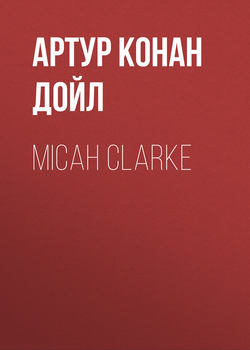Micah Clarke

Реклама. ООО «ЛитРес», ИНН: 7719571260.
Оглавление
Артур Конан Дойл. Micah Clarke
Chapter I. Of Cornet Joseph Clarke of the Ironsides
Chapter II. Of my going to school and of my coming thence
Chapter III. Of Two Friends of my Youth
Chapter IV. Of the Strange Fish that we Caught at Spithead
Chapter V. Of the Man with the Drooping Lids
Chapter VI. Of the Letter that came from the Lowlands
Chapter VII. Of the Horseman who rode from the West
Chapter VIII. Of our Start for the Wars
Chapter IX. Of a Passage of Arms at the Blue Boar
Chapter X. Of our Perilous Adventure on the Plain
Chapter XI. Of the Lonely Man and the Gold Chest
Chapter XII. Of certain Passages upon the Moor
Chapter XIII. Of Sir Gervas Jerome, Knight Banneret of the County of Surrey
Chapter XIV. Of the Stiff-legged Parson and his Flock
Chapter XV. Of our Brush with the King’s Dragoons
Chapter XVI. Of our Coming to Taunton
Chapter XVII. Of the Gathering in the Market-square
Chapter XVIII. Of Master Stephen Timewell, Mayor of Taunton
Chapter XIX. Of a Brawl in the Night
Chapter XX. Of the Muster of the Men of the West
Chapter XXI. Of my Hand-grips with the Brandenburger
Chapter XXII. Of the News from Havant
Chapter XXIII. Of the Snare on the Weston Road
Chapter XXIV. Of the Welcome that met me at Badminton
Chapter XXV. Of Strange Doings in the Boteler Dungeon
Chapter XXVI. Of the Strife in the Council
Chapter XXVII. Of the Affair near Keynsham Bridge
Chapter XXVIII. Of the Fight in Wells Cathedral
Chapter XXIX. Of the Great Cry from the Lonely House
Chapter XXX. Of the Swordsman with the Brown Jacket
Chapter XXXI. Of the Maid of the Marsh and the Bubble which rose from the Bog
Chapter XXXII. Of the Onfall at Sedgemoor
Chapter XXXIII. Of my Perilous Adventure at the Mill
Chapter XXXIV. Of the Coming of Solomon Sprent
Chapter XXXV. Of the Devil in Wig and Gown
Chapter XXXVI. Of the End of it All
APPENDIX
Отрывок из книги
With the home influences which I have described, it may be readily imagined that my young mind turned very much upon the subject of religion, the more so as my father and mother took different views upon it. The old Puritan soldier held that the bible alone contained all things essential to salvation, and that though it might be advisable that those who were gifted with wisdom or eloquence should expound the Scriptures to their brethren, it was by no means necessary, but rather hurtful and degrading, that any organised body of ministers or of bishops should claim special prerogatives, or take the place of mediators between the creature and the Creator. For the wealthy dignitaries of the Church, rolling in their carriages to their cathedrals, in order to preach the doctrines of their Master, who wore His sandals out in tramping over the countryside, he professed the most bitter contempt; nor was he more lenient to those poorer members of the clergy who winked at the vices of their patrons that they might secure a seat at their table, and who would sit through a long evening of profanity rather than bid good-bye to the cheesecakes and the wine flask. That such men represented religious truth was abhorrent to his mind, nor would he even give his adhesion to that form of church government dear to the Presbyterians, where a general council of the ministers directed the affairs of their church. Every man was, in his opinion, equal in the eyes of the Almighty, and none had a right to claim any precedence over his neighbour in matters of religion. The book was written for all, and all were equally able to read it, provided that their minds were enlightened by the Holy Spirit.
My mother, on the other hand, held that the very essence of a church was that it should have a hierarchy and a graduated government within itself, with the king at the apex, the archbishops beneath him, the bishops under their control, and so down through the ministry to the common folk. Such was, in her opinion, the Church as established in the beginning, and no religion without these characteristics could lay any claim to being the true one. Ritual was to her of as great importance as morality, and if every tradesman and farmer were allowed to invent prayers, and change the service as the fancy seized him, it would be impossible to preserve the purity of the Christian creed. She agreed that religion was based upon the Bible, but the Bible was a book which contained much that was obscure, and unless that obscurity were cleared away by a duly elected and consecrated servant of God, a lineal descendant of the Disciples, all human wisdom might not serve to interpret it aright. That was my mother’s position, and neither argument nor entreaty could move her from it. The only question of belief on which my two parents were equally ardent was their mutual dislike and distrust of the Roman Catholic forms of worship, and in this the Churchwoman was every whit as decided as the fanatical Independent.
.....
‘If all this be true,’ said I, ‘and if your mission is indeed as you have said, why did you even now propose to make for France?’
‘Aptly asked, and yet the answer is clear enough,’ he replied; ‘sweet and ingenuous as are your faces, I could not read upon them that ye would prove to be Whigs and friends of the good old cause. Ye might have taken me to where excisemen or others would have wanted to pry and peep, and so endangered my commission. Better a voyage to France in an open boat than that.’
.....